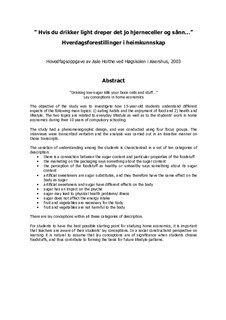Hvis du drikker light dreper det jo hjerneceller og sånn ...
Master thesis
Permanent lenke
http://hdl.handle.net/11250/2482246Utgivelsesdato
2003Metadata
Vis full innførselSamlinger
Sammendrag
“Drinking low-sugar kills your brain cells and stuff…” Lay conceptions in home economics The objective of the study was to investigate how 15-year-old students understand different aspects of the following main topics: 1) eating habits and the enjoyment of food and 2) health and lifestyle. The two topics are related to everyday lifestyle as well as to the students' work in home economics during their 10 years of compulsory schooling. The study had a phenomenographic design, and was conducted using four focus groups. The interviews were transcribed verbatim and the analysis was carried out in an iterative manner on those transcripts. The variation of understanding among the students is characterized in a set of ten categories of description: • there is a connection between the sugar content and particular properties of the foodstuff • the marketing on the packaging says something about the sugar content • the perception of the foodstuff as healthy or unhealthy says something about its sugar content • artificial sweeteners are sugar substitutes, and they therefore have the same effect on the body as sugar • artificial sweeteners and sugar have different effects on the body • sugar has an impact on the psyche • sugar may lead to physical health problems/ illness • sugar does not affect the energy intake • fruit and vegetables are necessary for the body • fruit and vegetables are not harmful to the body There are lay conceptions within all these categories of description. For students to have the best possible starting point for studying home economics, it is important that teachers are aware of their students' lay conceptions. In a social constructivist perspective on learning it is natural to assume that lay conceptions are of significance when students choose foodstuffs, and thus contribute to forming the basis for future lifestyle patterns.
